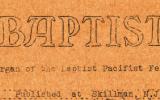CPS Unit Number 136-01
Camp: 136
Unit ID: 1
Operating agency: ABHMS
Opened: 7 1944
Closed: 10 1946
Workers
Total number of workers who worked in this camp: 25
-
 CPS Camp No. 136Men at Camp 136 contributed to The Baptist C.O., a newsletter published beginning in 1945.Digital image from the American Friends Service Committee: Civilian Public Service Records (DG 002), Swarthmore College Peace Collection, Swarthmore, Pennsylvania
CPS Camp No. 136Men at Camp 136 contributed to The Baptist C.O., a newsletter published beginning in 1945.Digital image from the American Friends Service Committee: Civilian Public Service Records (DG 002), Swarthmore College Peace Collection, Swarthmore, Pennsylvania
CPS Unit No. 136, a Mental Hospital unit at the State Home for Epileptics in Skillman, New Jersey, one of two CPS units operated by the American Baptist Home Mission Society (ABHMS), opened in July 1944. After hostilities ceased, the ABHMS withdrew from CPS as leaders did not want to be involved in peace time conscription. Selective Service operated the unit until it closed in October 1946. The men worked with the residents in a variety of activities.
State Home for Epileptics opened in the late 1898 as the New Jersey State Village for Epileptics in recognition that persons with epilepsy, often institutionalized in homes for those with mental deficiency or mental disorders, required different kind of care.
Designed as a self-sufficient agrarian community, the village was located on four hundred and two acres of land. Children attended the Village school while adult residents learned skills in carpentry, plumbing, sewing and housekeeping to assist with the general upkeep of facilities. Patients also learned some agricultural skills by working on the Village farm, which grew vegetables, fruit, wheat and hay, and kept livestock including dairy cows, pigs and chickens. The Village held regular social events, concerts, and agricultural fairs. Those residents who could not participate in these various activities and functions were patients in the hospital opened in 1913. The Village served as a center for research on epilepsy.
The Village suffered severe cutbacks in state funding during the Depression resulting in deferred maintenance and cramped housing. Shortage of qualified workers in World War II added to the difficulties.
ABHMS withdrew from CPS at end of hostilities as they did not want to be involved in peacetime conscription. They operated one other unit with the Brethren, CPS No. 74, the Eastern Shore State Hospital in Maryland.
Directors: Fred Mabee, William Gerber, Roland Austin
Fifteen men made up the unit. Some were married and brought their families as well.
The Skillman unit was authorized for fifteen CPS men. The men served as ward attendants and in other roles as needed in the Village.
The American Baptists supported both this CPS unit, as well as CPS unit no. 74 at Eastern Shore State Hospital. Both units were planned for a capacity of fifteen men.
The men contributed to The Baptist C. O. beginning in June 1945 with No. 3 published in November 1945.
The men lived in make-shift facilities since the hospital village could house only childless couples or singles who served the community as medical doctors, cooks and supervisors. (Baptist C.O., 1 (1945), 2)
Dekar suggests that the Baptist Peace Fellowship also supported living arrangements for wives and any children who followed their CO husbands. (p. 38)
In 1940, the Northern Baptist Convention approved the formation of a registry of Baptist COs, which was formed as Baptist men signed a statement “My Purpose Concerning War” as a positive stand for peace as daily duty. The Baptist Peace Fellowship sent a letter to all who signed the declaration of purpose or who inquired about the provisions of the Selective Training and Service Act of 1940. The Home Mission Society provided counseling and a mechanism for those who wished to make donations on their behalf to do so. Many individuals and local groups donated $35 per month for eighty Baptists in CO camps, or a total of nearly $34 thousand.
Towards the end of the war, a number of Baptist pacifists debated the merits of CPS, including the often meaningless nature of work, as well as work without pay. Henry Emerson Fosdick described CPS as “a system of internment camps at which forced labor without pay is exacted . . . as the price for being allowed to hold a religious belief”. (Baptist C.O., 1 (1945) 3.
One CPS man from Skillman, after he had left CPS criticized the Baptists for administering the camp at Skillman.
With this development we compromise our position completely. We align ourselves with Selective Service; we agree to carry out their orders and their program (with the implications of permanent conscription which lie behind it); we pay for their program, not ours. By doing so, we lose our chance of being an effective and ‘free’ group. We forfeit our chance of being a real aid to the pacifists in prison and in the camps. (JHS in Baptist C.O., 2 [1945] 5, in Dekar, p.28)
Walter C. Baker, A History of the New Jersey State Village for Epileptics. Belle Mead, NJ: Van Harlingen Historical Society, 1993.
Paul R. Dekar, Building a Culture of Peace: Baptist Peace Fellowship of North America, the First Seventy Years. Eugene, OR: Pickwick Publications, 2010.
For more in depth treatment on mental health units and training school units, see Steven J. Taylor, Acts of Conscience: World War II, Mental Institutions, and Religious Objectors. Syracuse, NY: Syracuse University Press, 2009.
